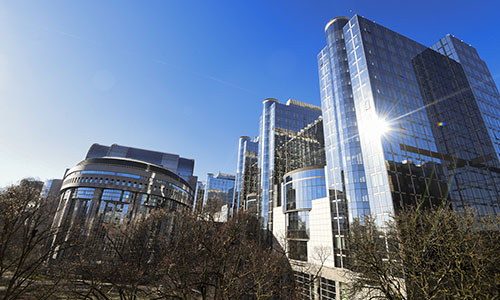EU trade agreements: delivering new opportunities in time of global economic uncertainties
Despite the difficult global economic climate, European companies have continued to make good use of the opportunities created by the European Union’s trade network – the largest in the world. In 2018 this network covered 31% of Europe’s trade exchanges, a figure that is set to rise significantly (to almost 40%) as more trade agreements enter into force, according to the European Commission’s annual report on the implementation of trade agreements released today. Overall, trade accounts for 35% of the EU’s gross domestic product (GDP).
In 2018 EU exports to and imports from trade agreement partners showed positive developments, with a continued growth of 2% and 4.6% respectively, with a strong performance of EU agri-food exports. The EU’s growing network of trade agreements is creating economic opportunities for workers across Europe, with over 36 million jobs being supported by exports to outside of the EU. The EU recorded a surplus of €84.6 billion in trade in goods with its trade agreement partners, compared to its overall trade deficit with the rest of the world of about €24.6 billion.
Commenting on the report, Commissioner for Trade Cecilia Malmström said “Trade agreements create opportunities for European businesses to grow and hire more people. Today’s report shows that overall trade is up, and more of our global trade is covered by preferential deals than ever before. Our food and drink exports in particular are flourishing thanks to lower tariffs and legal protection abroad for artisanal EU products like Champagne and Feta. The report also provides evidence of how our focus on trade and sustainable development is bearing fruit. Furthermore, we have taken a number of unprecedented steps to enforce the commitments made by our trade partners in the last year, including notably on workers’ rights. There is still work to be done, of course. But by opening up this data to the wider public we hope to launch a wider discussion about how to make sure trade agreements benefit as many citizens as possible.”
Looking at specific sectors across agreements, the 2018 report shows:
- EU agri-food exports to trade partners continued to grow with an overall increase of 2.2% compared to the previous year. Exports of agri-food products to South Korea also gained 4.8 %. Also noteworthy are agri-food exports to Georgia, Moldova and Ukraine, which grew by 11% compared to 2017;
- EU industrial goods exports also increased overall by 2%, with stronger growth among others for chemicals (2.5 %), mineral products (6 %) and base metals (4.4 %).
Looking for instance at one of the recent trade agreements, the report shows that in the first full calendar year (2018) of the EU-Canada trade agreement implementation:
- bilateral trade in goods grew by 10.3% and the EU’s trade surplus with Canada increased by 60%;
- EU goods exports to Canada rose by 15% (or €36 billion in extra export revenue), especially for sectors where import duties were previously high such as pharmaceuticals (up 29%), machinery (up 16%) or organic chemicals (up 77 %);
- EU Agri-food exports to Canada (accounting for 9% of total EU exports) rose by 7%.
Moreover, following intensive discussions in the joint committees created under the different trade agreements, several partner countries lifted barriers to trade, thus allowing more EU companies to benefit fully from the opportunities these agreements offer. Danish and Dutch farmers, for example, will be able to export beef to South Korea, while Poland and Spain will be able to export poultry meat to South Africa.
The report investigates also the impact of the provisions included in the dedicated ‘Trade and Sustainable Development’ (TSD) chapters, which are part of all modern EU trade agreements. These chapters aim at engaging with trade partners to implement international rules on labour and the environment, as incorporated in multilateral environmental agreements or International Labour Organisation (ILO) conventions. Recent achievements ahead of the entry into force of the respective agreements include the ratification by Mexico and Vietnam of ILO Convention 98 on the rights to organise and collective bargaining. Additionally, the agreements with Vietnam, Japan, Singapore, Mercosur and Mexico include reinforced commitments to effectively implement the Paris Agreement on Climate Change.
In 2018 and 2019, the EU also took several enforcement actions under its trade agreements, including in relation to labour standards. Among other examples, the EU requested a panel following South Korea’s failure to ratify ILO Conventions on workers’ rights, notably freedom of association and collective bargaining.
However, the report also highlights the need to increase efforts – together with Member States and stakeholders – to raise awareness of the opportunities trade agreements offer, as well as stepping up enforcement action so the agreements deliver the intended results.
The report will now be subject to discussion with the European Parliament and Member States’ representatives in the Council.
Background
At present, the EU has in place the largest trade network in the world, with 41 trade agreements covering 72 countries. Types of EU trade agreements include:
- “first generation” agreements, negotiated before 2006, that focus on tariff elimination;
- “second generation” agreements, that extend to new areas, including intellectual property rights, services and sustainable development;
- Deep and Comprehensive Free Trade Areas (DCFTA) that create stronger economic links between the EU and its neighbouring countries;
- Economic Partnership Agreements (EPA) focusing on development needs of African, Caribbean and Pacific regions.
For more information
Report on the implementation of Free Trade Agreements
